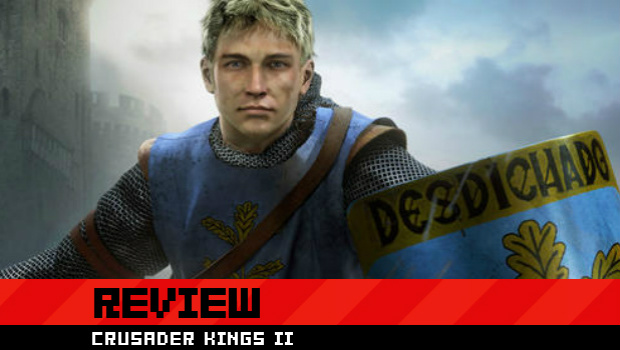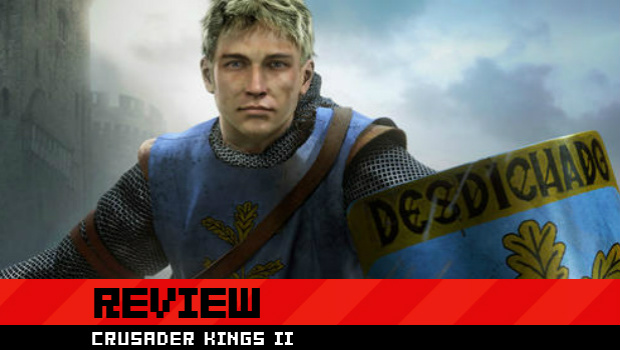Videogames and history have a wonderful and colorful relationship. Thousands of years of warfare, culture clashes, technological advances, political upheaval and intrigue have given developers a massive pool of content to work with and it’s given players countless “what if?” scenarios and outlets for their power fantasies. Despite this, 2004’s Crusader Kings managed to stand out from the crowd with its focus on dynasties and the elaborate web of medieval relationships. It offered something unique and managed to humanize the maps and statistics of the grand strategy genre.
A couple of days ago, on the most romantic day of the year, its long awaited sequel — Crusader Kings II — finally launched. After many long nights spent conquering Europe, crusading in the desert and insulting the Kaiser of the Holy Roman Empire, I’ve played enough so that I know whether this will be a love affair that continues or if I’ll be dumping it and moving on.

Crusader Kings II (PC)
Developer: Paradox Interactive
Publisher: Paradox Interactive
Released: February 14, 2012
MSRP: $39.99
Crusader Kings II puts you in the shoes of a medieval Christian noble and head of a dynasty. While it’s usually a male ruler, women can still hold such a position. Pagan and Muslim states exist only as non-player factions and frequently act as the antagonists, but no doubt diligent modders will make it so you can take charge of them in the future. It’s all in real time, so there’s no waiting about while your opponents take a turn, a boon both offline and online, where you can have up to 32 players. Your goal is to keep your dynasty alive for as long as possible and rack up lots of piety and prestige — which act as currency for specific actions and get added together to get the score for each ruler — maybe even outdoing history’s greatest noble families. Beyond that your goals are personal and will likely change dozens of times before your successes and failures are consigned to the history books or the scoreboard.
The grand strategy genre is not known for being easy to grasp, but Paradox has taken great strides to make Crusader Kings II one of the most welcoming games in the genre without sacrificing depth or complexity. The optional tutorials do a great job of easing players into leading their line to glory. Each major aspect of the game is split into beginner, intermediate and advanced levels but they are over quickly so you can get to ruling with haste.
The interface is equally friendly to newcomers and old hats alike, ditching the cumbersome yet charming interface of the original for a more minimalist approach. Paradox has made it significantly easier to lead your dynasty to greatness. I’m sure the mention of things being streamlined has some people panicking, but don’t fret, there’s still menus galore. Menus are layered and deep, but easier to deal with than before. The map, which you will be spending most of your time staring at, is a gorgeous and realistic rendering of the landscape and while I’ll admit I do miss the medieval look of the first game’s map, it wasn’t nearly as practical. You will probably spend more time looking at the color coded overlays than the geographical one though, making it look more like a very complicated game of Risk.

There’s a vast number of historical dynasties for you to take charge of between 1066 and 1337 and unlike the original, you can choose any time period between those dates. You will always play the head of a dynasty, but your position within the hierarchy of your chosen nation is more fluid. Depending on what family you choose and what date you start, you may be a Count, Duke, King or Emperor. Wars, plots and claims will ensure that there’s always plenty of opportunity for you to gain new titles, or, if you are unlucky, lose the ones you have.
Being a ruler wouldn’t be much fun if you didn’t have minions to boss about, and in Crusader Kings II these minions take the form of family members, vassals and your court. But you’ll quickly learn that they have their own ambitions and plots and will happily stand up to you if you cross them, especially if they think you owe them something. When dealing with your lessers it feels like a nerve wracking balancing act, if you give a Duchy to your favored son to keep him happy you might find yourself dealing with an angry noble who also has a claim on the land. Titles may be the currency with which you keep your minions appeased, but it’s cursed gold.
Relationships really are tricky things and in Crusader Kings II, but they are at the core of the game. How other nobles see you, both in your own realm and internationally, affects the actions you can take and how efficient you are as a ruler. You can manipulate others through a variety of methods. In your own court you can offer people titles, honorary or landed and every character, regardless of what court they are in, have their own ambitions that you can help them out with. If you want to befriend the widowed King of Poland you can offer him one of your lovely daughters. You’ll get an alliance (marriage is the only way you can forge such relationships) and if they both have the marriage ambition you’ll make them even happier. When you succeed it makes you feel like a puppet master of the highest caliber.

Regardless of your machinations, inevitably you’re going to have to deal with the occasional civil war. This happens most frequently due to succession disputes. There are several forms of succession that you can implement all the way from primogeniture, where your eldest son gets everything, to elective where every noble has a say. As long as the successor is a member of your dynasty you can keep playing, even if that successor gained his position through a less than legitimate route or even outright war. At first it’s strange, almost counter intuitive, but there will be moments where you are almost relieved that your universally loathed dynastic leader has been deposed by his more talented and well liked son.
War itself is a fairly straightforward, but enjoyable, affair. There are several ways you can go about starting a war, the simplest being through claims. Your character may already start out with claims on other rulers’ land, from there it’s a simple matter of raising your levies. Each vassal has their own levies and can use them as they see fit so long as their is no legislation taking control from them. However, when their liege tells them to get an army going, they bloody well better do it. It goes without saying, the more vassals you have, the more troops you get. Your levies appear the moment you call them as well, so there’s no faffing about while you wait for them to be trained. Vassals don’t like it when you take their troops away for a long time though, if you have a vassal who is especially annoyed with you it might be a good idea to not call on him. Luckily you can request levies individually or only raise your own personal levies.
You can also hire mercenaries, which require an initial payment on top of their wages and holy orders who will only fight pagans and Muslims but cost no gold, only piety. As you defeat enemy troops and conquer more land you’ll see your victory percentage increase, you don’t need to go so far as to conquer every single county your foe controls just to get the one you have a claim on, though. Any conquered province continues to add more to your victory percentage for as long as you control it, so wars go a lot more quickly than they did in the first game. If you don’t already have a claim, you can fabricate one or you can use a vassal’s claim to go to war, increasing both your own prestige and that of your minion. Unfortunately in those instances it is your vassal, rather than yourself, that gets direct control of the land. Paradox has done a great job making war less of a hassle, it encourages players to be more aggressive and pro active. War is still a major investment, in terms of money and prestige and losing one can really devastate your dynasty, but it’s not something you’ll want to shy away from.
The actual combat itself is almost entirely hands off, but it’s an improvement over Paradox’s similar titles. It still ends up being a battle of numbers and morale, but the addition of having your armies split into flanks add a more strategic element which makes it more interactive.

As you relax on your ornate throne planning your next great war there’s nothing that could kill the mood more than being told you need to do some economic planning or fiddle around with a bunch of sliders. Luckily that’s not something you need to worry about. The dreaded inflation from the original game is gone and your vassals are perfectly capable of running their own affairs for the most part. You will rely on your vassals for the levies, income and political support they provide, but it’s your council that you will rely on to expand your power base and protect yourself from enemies less obvious than armies. The council is made up from court members and each position is tied to one of the statistics which every character has. Your Spymaster should have a high intrigue stat, while your Chancellor needs to be very diplomatic. These characters will provide a bonus to your own stats but can also be sent out into the field to uncover plots, collect taxes, train troops or even fabricate claims on lands you desire.
While vassals run their own territory, you can still expand and upgrade both your holds and theirs. Holds have replaced buildings from the first game. They are split into cities, castles and churches and all give you different bonuses. A city gives you more taxes, but weaker troops, castles are the opposite and churches are inbetween but only give you the tax income if the ruling Bishop likes you more than the pope. Each hold can be given to a member of your court to control and come with their own upgrades which can be selected by you or your vassals. Customizing your realm this way is expensive but each hold offers plenty of benefits.
This historical period is often unfairly characterized as being backwards, but there are plenty of advances that you can discover. Technological improvements occur slowly, though you can select specific advances to focus on. Each county has its own level of cultural, economic and military technology and you can send members of your council to learn from them, adding that knowledge to your realm. It’s indirect, but you never feel like you don’t have control.

Plots, ambitions and decisions ensure that the game’s forward momentum keeps going, even if you aren’t dealing with wars, claim disputes or revolts. They differ depending on your station and tend to favor the lower ranks. Ambitions are usually pretty simple things like wanting to get married and father a son or get made Marshall by your liege, should you have one. Plots tend to be more sinister such as assassinating political rivals or overturning laws (again, only possible if you have a liege). For a plot to be successful you will need to invite other nobles into it, but that’s only possible if they like you more than their liege or the target. Decisions cause minor events, like throwing a big feast or inviting someone new to your court. Events like banquets and tournaments offer a little bit of roleplaying as you must select how your liege reacts to certain situations, there’s an element of chance involved and you may gain a negative or positive trait, some confer both. For instance, if your actions lead to you getting the “kind” trait, your intrigue will take a hit while your diplomacy will be enhanced. Other events will happen randomly throughout the game as well, so your character will always be able to grow, for better or worse.
While these intrigue actions keep you busy and may encourage you to really start being a sneaky bastard, there is a lack of diversity, especially if you are at the top of the pecking order. In my last game I was playing as the Premyslid dynasty of Bohemia, I still had a liege as Bohemia was part of the Holy Roman Empire, but I was a King, so I had the best of both worlds in terms of intrigue options. But even then it felt a bit lackluster. It was just a list of people to kill, council positions I could hold in the court of the Holy Roman Empire and one piece of political legislation I could plot to overturn. It was a long list, but it was a dull one. In other sessions it was the same sort of thing, but shorter.
The handful of events you can cause through decisions are always the same and after you’ve held a couple of feasts and tournaments they stop being very memorable, they just become a way for you to potentially augment your stats. They are welcome diversions and thanks to the random nature of the game the outcomes frequently differ even if you’ve witnessed the event several times before, but I can’t help but wish there was more variety.
The most positive aspect of this system is that it makes everyone else significantly more interesting. Since every character has their own ambitions and the ability to plot, there’s always something going on. Sometimes that will mean you are being showered with notifications about someone doing something, but frequently you can either use that against them or aid them in their devilish schemes. It’s a double sided sword, however. Your own vassals will constantly be trying to murder each other and often they are members of your own dynasty, that’s a big risk. The AI is so obsessed with being top dog that the big picture is ignored. Trying to control a bunch of greedy, envious, overgrown children might be historically accurate, but it can get a tad annoying. You can, however, put a stop to their plans if you discover them and they don’t even have to like you very much to put their ambitions on the back burner. Even when your vassals are being annoying idiots, the results can be well worth it. Those tense moments when it looks like you’re going to lose everything you worked for thanks to a spoiled bastard son, only for another noble to assassinate him are what makes the game so unique.

You may have noticed that I’ve gotten near the end of the review with barely a mention of crusades. Considering it’s in the title, this may seem a tad strange. Crusader Kings II has crusades coming out of every pore. It’s just that I never really felt compelled to go on one. When a crusade is called you’ll get a big notification and then a flag will appear on the screen for its duration, but it always felt that the crusades were something that happened to other people. I could get involved if I wanted, but I had my own important business to attend to. This is far from a criticism, though. With the amount of crusades that occur, you’d never get anything done if you kept participating in them. There’s certainly plenty of reasons to join in, it just never felt necessary for the dynasties I played for the most part.
My lack of crusade experience really did make me feel like a bad Catholic, which is odd because I’m not any kind of Catholic. So I did eventually jump into the Crusade scenario. It’s not really a scenario though, it’s just the date of The Third Crusade. There was certainly more of a push to go and defend Christendom and it was the most tense game I’d played. But when it comes down to it, I prefer to ignore the Pope or install an antipope than go on bloody holy wars for him. When dealing with the Pope I find it best to treat them terribly and ask for forgiveness later. He might excommunicate you, but I found that to be something I could deal with. Excommunication gives your enemies a legitimate excuse to go to war with you, so it’s a good idea to be prepared, but it’s not the massive threat that it appears to be. Of course, like everything in Crusader Kings II your experience of excommunication could be entirely different from mine. It’s perfectly possible to have made a few too many enemies, anger the Pope and find most of Europe out for your blood.
That’s really what makes the game so damn fun. So much can happen and a plan usually only lasts for a few minutes before you have to reevaluate it. It’s an incredibly dynamic game that seems to perfectly simulate the state of flux that Europe and the Middle East were in during the Middle Ages. Crusader Kings II is exactly the sort of game I was hoping it would be. As deep and complex as its predecessor, but more accessible. It also manages to avoid some of the stability and bug issues that Paradox titles are known for. This is easily the most polished and bug free of all their titles to date, apart from the occasional placeholder text that crops up. The folks over at Paradox have out done themselves and set the bar extremely high. If you are looking for a new strategy game to sink an insane amount of time into, then look no further.





